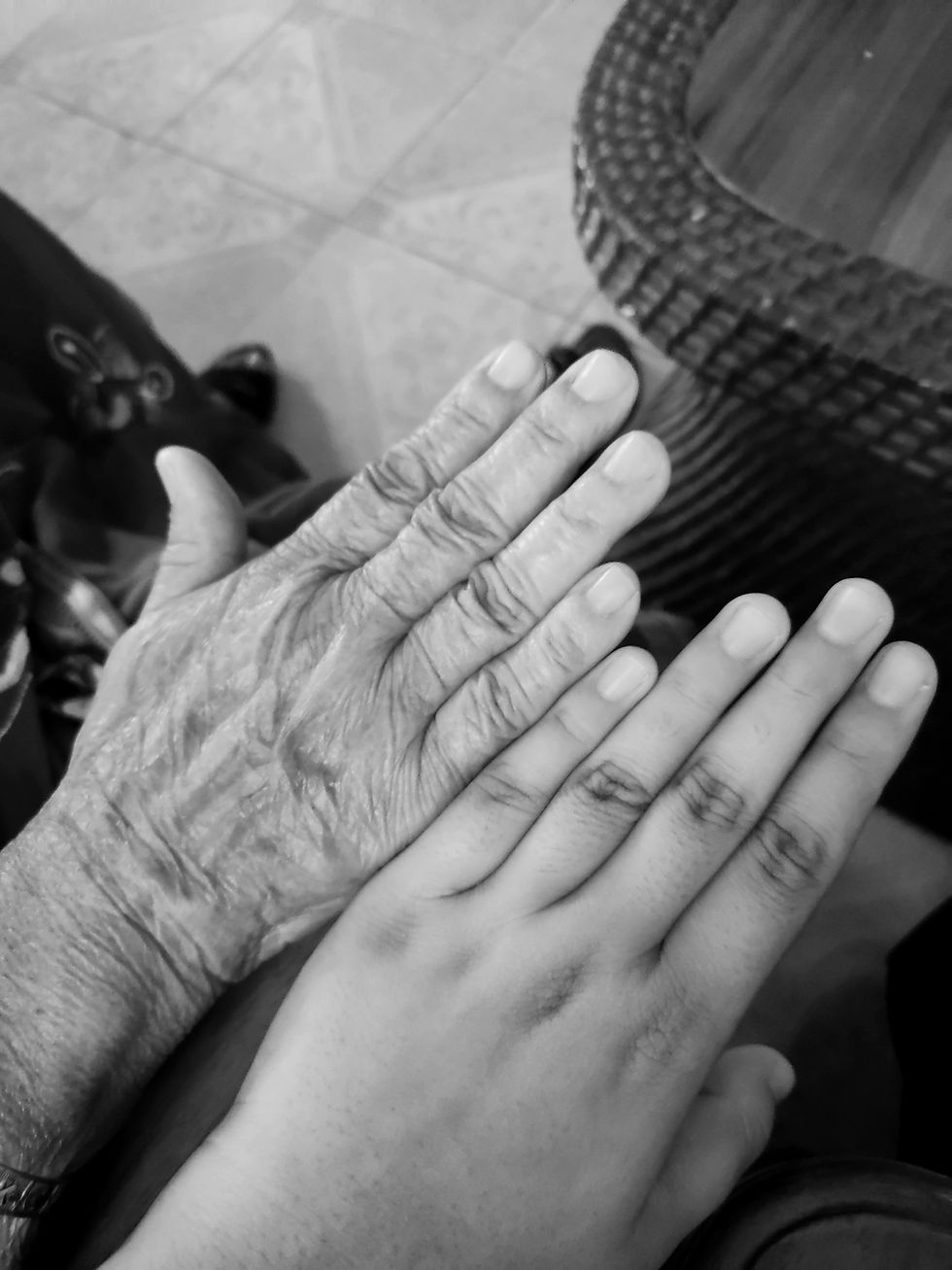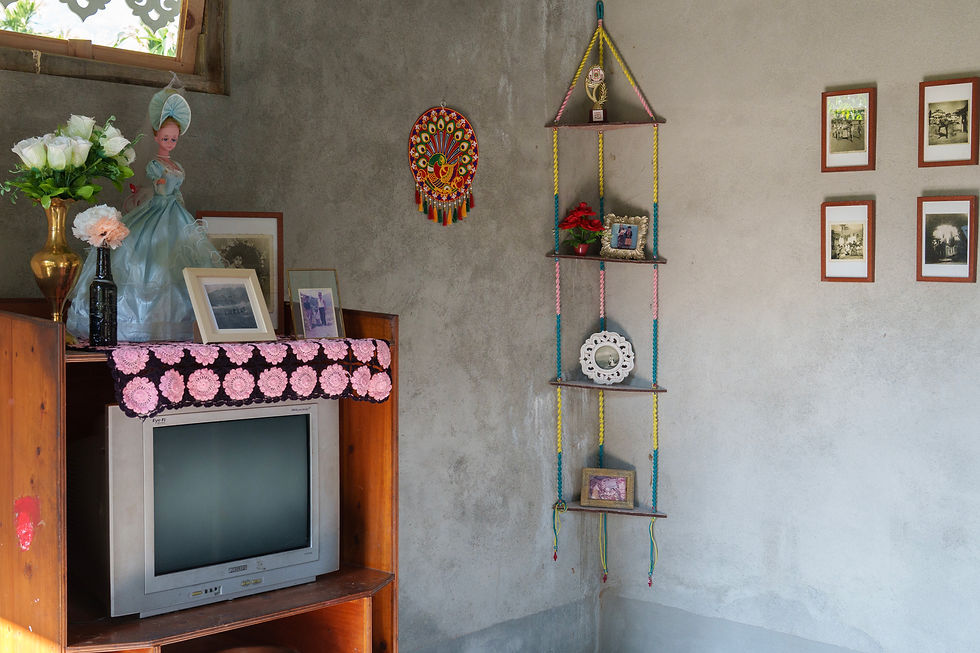Conversations with Our Mothers: What do We leave Behind and What Do We Carry Forward?
- Dipti Tamang
- Jul 31, 2025
- 7 min read
Updated: Aug 1, 2025
Aama- the word itself feels like HOME.
Often taken for granted, silenced and ignored, we all have stories to tell of our mothers. We carry it in our Hearts and We wish maybe we could tell it aloud?
What form would these conversations take?
How do we define our relationship with our mothers?
Complicated, Emotional, Difficult, Challenging, Supportive, Anxious, Hurtful, Loving, Warm, Forgiving and so much more.
We do not want to idealize these spaces and relationships- for the space we call HOME is not free of the patriarchal, gendered cultural hierarchies and not every HOME is a safe space.
We often fail to understand how our traumas take birth within these spaces in the first place,shaping us as adults and these relationships can be complicated.
This is not a conversation to idealize our mothers- For they are human too- shaped not only by their individual journey but a journey defined by and within patriarchal, conservative, traditional systems embedded in parochial understandings of gender, patriarchy and heteronormative structures.
The effort in igniting these conversations is to generate dialogue and curate spaces for difficult conversations, while holding space for our own Self. We seek to ask questions-which perhaps she could not, perhaps she did or perhaps she chose not to. So, we engage with these issues of Choice, Agency, Voice and everything in between.
Dipti Tamang-
I wanted to talk about my mother- reflecting on her journey. Realizing, Acknowledging and Maybe making a small effort to apologize for my own role in her silencing within her own Home.
She created a Home for us, but did we do the Same? Or did we fail? Did she loose herself in becoming our Mother? Who is She if this identity is taken away from her and would she be okay letting go of it in the first place to begin with? Do I have that agency?
These questions have troubled me- as a daughter as a feminist. Often, I find myself in conflict with myself these two roles overlapping at times, confrontational other times.
We received some powerfully emotional responses on Aama's Journey - Chapter 1 at the Gender & Sexuality archive, following this self-reflection of mine. The GSA is an endeavor to curate spaces for these stories to come together.
Bringing together these responses, we have put these threads together as an ongoing dialogue from our own respective spaces to engage with questions of and create our own understanding of gender, patriarchy and sexuality in the Hills.
Praveen Chettri

Unlike Dipti’s mother, my mother chose not to change her name or surname after marriage. As a tribal woman, she continues to be known as Nima Lepcha, even after marrying into a dominant-caste Brahman Chettri family. In a society where women are often expected to subsume their identities particularly through patrilineal naming practices her choice can be seen as a quiet but powerful act of resistance. It was not only an assertion of personal autonomy, but also a refusal to let her tribal identity be erased within the hierarchies of caste and patriarchy.
Uden Bhutia

‘Ama, Haath Poldaina tapaiko?’
I asked my mother out of concern, worry and amazement as she just touched the hot tea pan with her barehand and shifted it from one oven to another in a matter of few seconds. I was 15 then and this ‘hot pan trick’ had been a free show for me ever since I could remember and finally at 15, I somehow decided to question her, reasons unknown.
To this my Ama, Sujata Pradhan answered, ‘Haath Morisakyo’.
I took this as an answer then, not diving deep into it.
At 35, after becoming a mother myself 5 years ago, I started seeing my mother as a mother, and not just a woman.
My mother worked hard and selflessly that chores became habits- a natural extension of her Self;her indispensable identity.
She stopped caring for herself, placing the needs of the entire household before her own.
My father was mostly posted out of our hometown for work. In his absence, it was my mother who handled everything alone, including the rearing and caring of two girls (my sister and me) with a five-year age gap- on her own.
Racing from the kitchen to our needs, she was so ruggedly pushing herself as best as she could; perhaps learning new skills which she would come to naturalize someday; and in doing so, maybe she was losing herself bit by bit. Losing the person, she was in becoming the new person that these realities now demanded her to be.
I now not only understand but perhaps feel what she meant when she said, her hands are dead; for I also now grow into a woman- as a mother, a wife and a daughter.
I can now finally measure the pressure and effort she put in to run the family. How kitchen chores looked effortlessly easy at the cost of her becoming numb to the heat.
Why do we never pause to question how women perform or maybe are compelled to perform these extraordinary feats, with ease.
As a daughter I now wonder, ‘Was it only the heat she was numb to, or has she numbed to everything else?’
This ‘hot pan theory’ as I call it, is not just limited to my mother.
Yesterday, I was in a hurry. I couldn’t find the tongs, so I just tossed the hot roti over the flame with my bare hands and put them on the plate; and I wonder when did I master this art? Will my hands go numb someday, as well?
My mother raised me well; I am her daughter after all.
I now see her. I now hold her hand and want those hands to rest and feel.
This is her story; and I carry it within me.
Bojuaama- Pranay Thapa

Bojuaama (grandmother), as we refer to her at home, is around 84 years old. She has epitomisedwhat it means to be a woman as per the norms of society. I wonder if she ever lived for herself. She often brings this up in our conversations about wanting to be a nun as a teen, and in recent times, when I asked her again about the same, she had teary eyes narrating the same. Her name, as per the government IDs, is Krishna Maya Mangar, but she often, in resentment, states tyomora haru le naam galat lekhideko vote ko time ma, mero naam ta Bishnu honi. Born in Suruk, she grew up at her stepfather’s home in Najok and now settled in Lava Bazar after her marriage to my grandfather. She may have rarely been called Bishnu or Krishna in her lifetime. She has always been Bojuaama for me, Jeth didi after her husband and Kumar ama, after her eldest son. After my grandfather’s paralysis, she took the entire burden of providing for her seven children, who were themselves adults and teens. One thing she never gave up was sending her children to school, even though she never went to one. I often remind her, saying Akshar chinne chai banaidinu bhayecha tapaile chora chori haru lai. She smiles widely on hearing that. She recounts how her mother used to scold her and states that Chari hunu ko lagi school padnu pardaina, ketimanche le school goyo bhane chitti lekhnu sikcha. While her brother was sent to father’s school, she was often asked to do all the household chores. That is when she learnt to smoke a bidi as a retaliation.
During her marital days, she recounts being a victim of domestic abuse and having no agency under my grandfather’s control. Sometimes, she shares with me how her husband used to bring a woman home, and for whom she would have to offer tea and food while they giggled and spent time inside a room in the forest department quarter where they lived. Whenever she retaliated, the next day would ensure bruises on her face, which she often had to hide or tell others as daurama jada ladeko. Years later, when my grandfather was bedridden, she would jokingly taunt him by saying Timilai ta keti haru ghumalo paap lageko.
Bojuaama fondly likes to remember and share her stories with us at home. We sometimes hear them with interest; other times, we complain about her repetitive storytelling, often feeling bored. She now goes around Lava, meeting her friends or looking after her small kitchen garden where she grows lava ko saag, chimphing, seebi, and dhaniya. She is a religious woman who dedicates her time to ghar ko puja with occasional visits to Lava monastery and a Church where she spends half of her day talking with the caretaker who had some four years ago had asked her to convert to Christianity. Then, she had vehemently been offended by that offer and told us buityo aimey le ta dharam ma po lagnu bhanda raicha. I have never understood why Christianity in our hills is referred to as dharam, or is it just a Lava Bazar thing? I have laughed at her ironic reaction, too, often teasing her about her teenage dream of being a nun.
Bojuama shares all these stories with us now and in recurring intervals. I believe she relives and feels bitter about those days by sharing with us, and at the same time, it lightens her weary heart.
The photo has roughly been taken around 1995 to 1996 as per what i have been told by my family. No exact date available
Aanchal Singh

Wrinkles usually symbolize "old age," but as I think more deeply, it isn't just about age; it's about the sacrifices my aama (maternal grandmother) has made across generations for her family. In sacrificing everything for her loved ones, she lost her inner child, which she is now trying to find and heal through me. Sometimes, when I ask her, "Aama, why didn’t you choose yourself?" she simply answered, "Chori ko janma hare ko karma" (which roughly translates to: "Giving birth to a girl is equivalent to being defeated by fate"). The irony is that she is still content with sacrificing and believes that, as a woman, it is her responsibility to prioritize her family. Yet at the same time, she wishes to enjoy her freedom through my experiences—she wants me to become an independent and successful woman. So, can we call it her innocence? Maybe yes—or maybe she just doesn’t know how to choose herself first.
We invite you to share the stories of the women in your lives mothers, aunts, grandmothers, and others who have long lived in the shadows of family histories. This is an effort to critically engage with questions of gender, sexuality, identity, and the layered realities of life in the Darjeeling-Sikkim Himalayas. We are particularly interested in personal narratives that explore these intersections in nuanced and meaningful ways. SUBMIT NOW




Comments